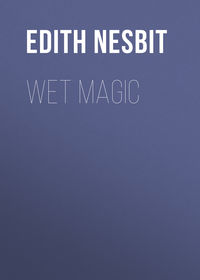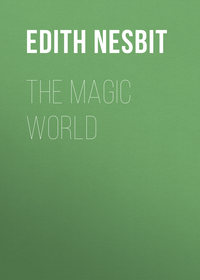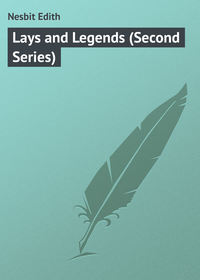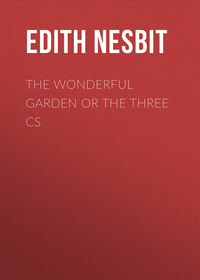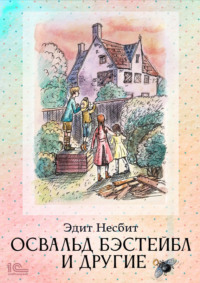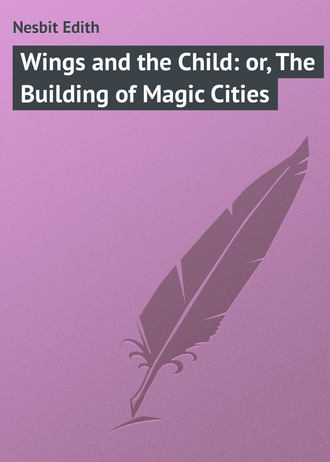 полная версия
полная версияWings and the Child: or, The Building of Magic Cities

Nesbit E. Edith
Wings and the Child; Or, The Building of Magic Cities
PART I
CHAPTER I
Of Understanding
It is not with any pretension to special knowledge of my subject that I set out to write down what I know about children. I have no special means of knowing anything: I do, in fact, know nothing that cannot be known by any one who will go to the only fount of knowledge, experience. And by experience I do not mean scientific experience, that is the recorded results of experiments, the tabulated knowledge wrung from observation; I mean personal experience, that is to say, memory. You may observe the actions of children and chronicle their sayings, and produce from these, perhaps, a lifelike sketch of a child, as it appears to the grown-up observer; but observation is no key to the inner mysteries of a child's soul. The only key to those mysteries is in knowledge, the knowledge of what you yourself felt when you were good and little and a child. You can remember how things looked to you, and how things looked to the other children who were your intimates. Our own childhood, besides furnishing us with an exhaustless store of enlightening memories, furnishes us with the one opportunity of our lives for the observation of children – other children. There is a freemasonry between children, a spontaneous confidence and give-and-take which is and must be for ever impossible between children and grown-ups, no matter how sympathetic the grown-up, how confiding the child. Between the child and the grown-up there is a great gulf fixed – and this gulf, the gulf between one generation and another, can never be really bridged. You may learn to see across it, a little, or sometimes in rare cases to lean very far across it so that you can just touch the tips of the little fingers held out from the other side. But if your dealings with those on the other side of the gulf are to be just, generous, noble, and helpful, they must be motived and coloured by your memories of the time when you yourself were on the other side – when you were a child full of your own hopes, dreams, aims, interests, instincts, and imaginings, and over against you, kindly perhaps, tenderly loving, often tenderly loved, but still in some mysterious way antagonistic and counting as "Them," were the grown-ups. I might say elders, parents, teachers, spiritual pastors and masters, but the word which the child himself uses seems to me, for all reasons, to be the best word for my use, because it expresses fully and finally the nature of the gulf between. The grown-ups are the people who once were children and who have forgotten what it felt like to be a child. And Time marks with the same outward brand those who have forgotten and those who do not forget. So that even the few who have managed to slip past the Customs-house with their bundle of memories intact can never fully display them. These are a sort of contraband, and neither the children nor the grown-ups will ever believe that that which we have brought with us from the land of childhood is genuine. The grown-ups accuse us of invention, sometimes praise us for it, when all we have is memory; and the children imagine that we must have been watching them, and thus surprised a few of their secrets, when all that we have is the secrets which were our own when we were children – secrets which were so bound up with the fibre of our nature that we could never lose them, and so go through life with them, our dearest treasures. Such people feel to the end that they are children in a grown-up world. For a middle-aged gentleman with a beard or a stout elderly lady with spectacles to move among other elderly and spectacled persons feeling that they are still children, and that the other elderly and spectacled ones are really grown-ups, seems thoroughly unreasonable, and therefore those who have never forgotten do not, as a rule, say anything about it. They just mingle with the other people, looking as grown-up as any one – but in their hearts they are only pretending to be grown-up: it is like acting in a charade. Time with his make-up box of lines and wrinkles, his skilful brush that paints out the tints and the contours of youth, his supply of grey wigs and rounded shoulders and pillows for the waist, disguises the actors well enough, and they go through life altogether unsuspected. The tired eyes close on a world which to them has always been the child's world, the tired hands loose the earthly possessions which have, to them, been ever the toys of the child. And deep in their hearts is the faith and the hope that in the life to come it may not be necessary to pretend to be grown-up.
Such people as these are never pessimists, though they may be sinners; and they will be trusting, to the verge of what a real grown-up would call imbecility. To them the world will be, from first to last, a beautiful place, and every unbeautiful thing will be a surprise, hurting them like a sudden blow. They will never learn prudence, or parsimony, nor know, with the unerring instinct of the really grown-up, the things that are or are not done by the best people. All their lives they will love, and expect love – and be sad, wondering helplessly when they do not get it. They will expect beautiful quixotic impulsive generosities and splendours from a grown-up world which has forgotten what impulse was: and to the very end they will not leave off expecting. They will be easily pleased and easily hurt, and the grown-ups in grain will contemplate their pains and their pleasures with an uncomprehending irritation.
If these children, disguised by grown-up bodies, are ever recognised for what they are, it is when they happen to have the use of their pens – when they write for and about children. Then grown-up people will call them intelligent and observant, and children will write to them and ask the heart-warm, heart-warming question, "How did you know?" For if they can become articulate they will speak the language that children understand, and children will love, not them, for their identity is cloaked with grey grown-up-ness, but what they say. There are some of these in whom the fire of genius burns up and licks away the trappings under which Time seeks to disguise them – Andersen, Stevenson, Juliana Ewing were such as these – and the world knows them for what they were, and adores in them what in the uninspired it would decry and despise.
To these others who have the memories of childhood untainted and yet have not the gift and relief of words, to these I address myself in the first instance, because they will understand without any involved explanation on my part what it is that I am driving at, and it is these who, alone, can teach the real grown-ups the things which they have forgotten. For these things can be taught, these things can be re-learned. I would have every man and woman in whom the heart of childhood still lives, protest, however feebly and haltingly, yet with all the power of the heart, against machine-made education – against the instruction which crams a child with facts and starves it of dreams, which forces the free foot into heavy boots and bids it walk on narrow pavement, which crushes with heavy hand the wings of the soul, and presses the flower of imagination flat between the pages of a lexicon.
CHAPTER II
New Ways
"What," we ask with anxious gravity, "what is the best sort of teaching for children?" One might as sanely ask what is the best sort of spectacles for men, or the best size in gloves for women. And the blind coarse generalisation which underlies that question is the very heart and core of the muddled, musty maze we call education. We talk of the best sort of education for children, as we might talk of the best sort of polish for stoves, the best sort of nourishment for mice. Stoves are all alike, they vary in ugliness perhaps, but the iron soul of one is as the iron soul of the other. The polish that is good for one is good for all. Mice may, and do, vary in size and colour; their mousehood does not vary, nor their taste for cheese. In the inner nature, in the soul and self of it, each child is different from any other child, and the education that treats children as a class and not as individual human beings is the education whose failure is bringing our civilisation about our ears even as we speak.
Each child is an explorer in a new country – an explorer with its own special needs and curiosities. We put up iron railings to keep the explorers to our own sordidly asphalted paths. The little free wild creatures would seek their meat from God: we round them into herds, pen them in folds, and feed them with artificial foods – drab flat oil cakes all alike, not considering that for some brown nuts and red berries, and for some the new clean green grass, may be the bread of life.
Or, if you take the mind of a child to be a garden wherein flowers grow that might be trained to beauty, you bring along your steam-roller, and crush everything to a flat field where you may grow cabbages. It is so good for the field, you say – because you like cabbages.
Liberty is one of the rights we claim for ourselves, though God knows we get little enough of it and use still less; and Liberty is one of the rights that a child above all needs – every possible liberty, of thought, of word, of deed. The old systems of education seem to have found it good to coerce a child for the simple sake of coercion – to make it do what the master chose, to make it leave undone those things which it wished to do and to do those things which it did not wish to do – nay, more, wished violently and conclusively not to do. To force the choice of the teacher on the child, to override the timid natural impulses of the child with the hard hoofs of the teacher's individuality, to crush out all initiative, to force the young supple mind into a mould, to lop the budding branches, nip off the sensitive seeking tendrils, to batter down the child's will by the brute force of the grown-up will, to "break the child's spirit," as the cursed phrase used to run – this was, in effect, what education meant. There was a picture in Punch, I remember – at least I have forgotten the picture, but I remember the legend: "Cissy, go and see what Bobbie's doing, and tell him not to."
It did not much matter what you made a child do, so long as it was something against the grain. He was to learn, not what he with his wonderful new curiosities and aptitudes longed to learn, but what you wished to teach; you with your dulled senses – dulled in the same bitter school as that in which he was now a sad learner.
Generation after generation has gone on, pounding away at the old silly game, each generation anxious and eager to hurt the new one as it, in its time, was hurt. Each generation must, one would have thought, have remembered what things hurt children and how much these things hurt, and yet this intolerable cycle of bullying and punishment and repression went on and on and on. Children were bullied and broken – and grew up to bully and break in their turn. It must be that this was because the grown-ups did not remember. Those who have the care of children, who work for them, who teach them, should be those who do remember: those who have not forgotten what it feels like to be a child – any sort of child. For, though children are all different, there is a common measure among them as there is among men. A law for men cannot be good if it be made – as indeed but too often happens – by those who have forgotten what it used to feel like to be a man; and what sort of poetry do you get from one who has forgotten beauty and sorrow, and the Spring, and how it feels to be young and a lover? And if the people who have the care of children have forgotten what it feels like to be a child, those who do remember should remind them. They should be reminded how it feels to be not so very much higher than the table, how it feels not to be so clever as you are now, and so much more interested in so much more – how it feels to believe in things and in people as you did when you were new to the journey of life – to explore every road you came to, to trust every person you met. It is a long time ago, but can you not remember the days when right and wrong were as different as milk and mud, when you knew that it was really wrong to be naughty and really good to be good, when you felt that your mother could do no wrong and that your father was the noblest and bravest of men? Do you remember the world of small and new and joyous and delightful things? Try to remember it if you would know how to help a child instead of hindering it – try to look at the world with the clear, clean eyes that once were yours in the days when you had never read a newspaper or deceived a friend. You will then be able to see again certain ideals, unclouded and radiant, which the dust of the crowded highway and the smears of getting-on have dimmed and distorted – quite simple ideals of love, faith, unselfishness, honour, truth. I know these words are often enough on the lips of all of us, but a child's ear will be able to tell whether the words spring from the lips or the heart. Look back, and you will see that you yourself were also able to distinguish these things – once.
Education as it should be, the unfolding of a flower, not the distorting of it, is only possible to those who are willing and able themselves to become as little children.
It is because certain great spirits have done this and have tried to teach others to do it, that reforms in education have begun to be at least possible. Froebel, Pestalozzi, Signora Montessori and many a lesser star has shone upon a new path. And public interest has centred more and more on the welfare of the child. Books are written, societies formed, newspapers founded in the interests of the child, and true education becomes a possibility.
And well indeed it is for us that this is so. For the education of the last three hundred years has led, in all things vital and spiritual, downhill all the way. We have gone on frustrating natural human intelligences and emotions, inculcating false doctrines, and choking with incoherent facts the souls which asked to be fed with dreams-come-true – till now our civilisation is a thing we cannot look at without a mental and moral nausea. We have, in our countrysides, peasants too broken for rebellion, in our cities.
The mortal sickness of a mindToo unhappy to be kind.If ever we are to be able to look ourselves and each other in the face again it will be because a new generation has arisen in whose ears the voice of God and His angels has not ceased to sound. If only we would see the things that belong to our peace, and lead the children instead of driving them, who knows what splendid thoughts and actions they in their natural development might bring to the salvation of the world?
In the Palace of Education which the great minds have designed and are designing, many stones will be needed – and so I bring the little stone I have hewn out and tried to shape, in the hope that it may fit into a corner of that great edifice. For if anything is to be done, it is necessary that all who have anything to give, shall give it. As Francis Bacon said:
"Nothing can so much conduce to the drawing down, as it were, from heaven a whole shower of new and profitable Inventions, as this, that the experiments of many … may come to the knowledge of one man, or some few, who by mutual conference may whet and sharpen one another, so that by this … Arts may flourish, and as it were by a commixture and communication of Rays, inflame one another… This sagacity by literate experience may in the mean project and scatter for the benefit of man many rudiments to knowledge which may be had at hand."
And that is why I have left for a little while the telling of stories and set myself to write down something of what I know about children – know by the grace of memory and by the dreams of childhood, to me, thank God, persistent and imperishable.
CHAPTER III
Playthings
The prime instinct of a child at play – I do not mean a child at games – is to create. I use the word confidently. He will make as well as create, if you let him, but always he will create: he will use the whole force of dream and fancy to create something out of nothing – over and beyond what he will make out of such materials as he has to hand. The five-year-old will lay a dozen wooden bricks and four cotton reels together, set a broken cup on the top of them, and tell you it is a steam-engine. And it is. He has created the engine which he sees, and you don't see, and the pile of bricks and cotton reels is the symbol of his creation. He will silently borrow your best scissors and cut a serrated band of newspaper, which he will fasten round his head (with your best brooch, if he cannot find a pin), hang another newspaper from his shoulders, and sit in state holding the hearth-brush. He will tell you that he is a king – and he is. He has created crown, robes, sceptre, and kingship. The paper and the rest of it are but symbols.
And you shall observe that the toys which the child loves best are always those toys which lend themselves to such symbolic use.
Christmas is at hand. You go to buy gifts for the child, in memory of that Other Child whose birthday gifts were gold, frankincense, and myrrh. You go into the toyshops, elbowing your way as best you can, looking for such toys as may aid the child in his work of creative imagination.
You find a vast mass and litter and jumble of incredible futilities – things made to sell, things made by people who have forgotten what it is like to be a child. Mechanical toys of all sorts, stupid toys, toys that will only do one thing, and that thing vulgar and foolish. And, worst outrage of all, ugly toys, monstrosities, deformities, lead devils, grinning humpbacked clowns, "comic" dogs and cats, hideous mis-shapen pigs, incredible negroes, intolerable golliwogs. All such things the natural child, with a child's decent detestation of deformity, will thrust from it with screams of fear and hatred, till the materialistic mother or nurse explains that the horror is not really, as the child knows it to be, horrible and unnatural, but "funny." Thus do we outrage the child's inborn sense of beauty, which is also the sense of health and fitness, and teach it that deformity is not shocking, not pitiable even, but just "funny." All these ugly toys are impossible as aids to clean imagination.
So, almost in as great, though not in so harmful a degree, is the "character doll." The old doll was a doll, and not a character. Therefore she could assume any character at your choice. The character doll is Baby Willy, and can never be anything else, unless imagination, exasperated and baffled, christens him Silly Billy in the moment of furious projection across the nursery floor. But the old doll, with her good, expressionless face and clear blue eyes, could be a duchess or a dairymaid, a captive princess or a greengrocer's wife keeping shop, a cruel stepmother or Joan of Arc. I beg you to try Baby Willy in the character of Joan of Arc.
You cannot hope to understand children by common-sense, by reason, by logic, nor by any science whatsoever. You cannot understand them by imagination – not even by love itself. There is only one way: to remember what you thought and felt and liked and hated when you yourself were a child. Not what you know now – or think you know – you ought to have thought and liked, but what you did then, in stark fact, like and think. There is no other way.
Do you remember the toys you liked, the toys you played with? Do you remember the toys you hated – after the fading of the first day's flush of novelty, of possession? The houses with doors that wouldn't open? The stables with horses that wouldn't stand up? The shops whose goods were part of their painted shelves, whose shopmen were as fast glued behind the counter as any live shop-assistant before the passing of the Shops Act?
And the mechanical toys – the clockwork toys. The engine was all right, even after the clockwork ran down for the last time with that inexorable whizz which told you all was over; you could build tunnels with the big brown books in the library and push the engine through with your hand – it would run quite a long way out on the other side. But the other clockwork things! How can one love and pet a mouse, no matter how furry its superficial exterior, when underneath, where its soft waistcoat and its little feet should be, there is only a hard surface from which incompetent wheels protrude? And the ostrich who draws a hansom cab, and the man who beats the boy with a stick? When they have whizzed their last, who cares for the tin relics outliving their detestable activities?
Think of the toys you liked: the Noah's Ark – full of characters. What stirring dramas of the chase, what sporting incidents, what domestic and agricultural operations could be carried out with that most royal of toys. Mr. Noah, I remember, was equally competent and convincing as ploughman or carter. But his chief rôle was Sitting Bull. His sons were inimitable as Chingachgook and scalp hunters generally. You cannot play scalp hunters with the mechanical ostrich indissolubly welded to a hansom cab.
You loved your bricks, I think, especially if you lived in the days when bricks were of well-seasoned oak, heavy, firm, exactly proportioned, before the boxes of inexact light deal bricks, with the one painted glass window, began to be made in Germany. How finely those great bricks stood for Stonehenge, and how submissively Anna, the Dutch doll, whose arms and legs were gone, played the part of the Sacrifice. If you remember those bricks you will remember the polished, white wooden dairy sets in oval white boxes – churns and tubs and kettles and pots all neatly and beautifully turned. You will remember the doll's house furniture, rosewood, duly mitred and dovetailed, fine cabinet-makers' work, little beautiful models of beautiful things. Now the dolls' house furniture is glued together. You can't trust a light-weight china doll to sit on the kitchen chairs… But you can get your mechanical ostrich and your golliwog…
Children in towns are cut off, at least for most of the year, from the splendid and ever-varying possibilities of clay and mud and sand, oak-apples and snow-berries, acorn-cups and seaweed, shells and sticks and stones which serve and foster the creative instinct, the thousand adjuncts to that play which is dream and reality in one.
For them, even more than for the happier country children, it is good to choose toys which shall possess, above and before all, the one supreme quality of a good toy. Let it be a toy that is not merely itself, like the ostrich of whom I hope you are now as weary as I, but a toy that can be, at need, other things. A toy, in fine, that your child can, in the fullest and most satisfying sense, play with.
CHAPTER IV
Imagination
To the child, from the beginning, life is the unfolding of one vast mystery; to him our stalest commonplaces are great news, our dullest facts prismatic wonders. To the baby who has never seen a red ball, a red ball is a marvel, new and magnificent as ever the golden apples were to Hercules.
You show the child many things, all strange, all entrancing; it sees, it hears, it touches; it learns to co-ordinate sight and touch and hearing. You tell it tales of the things it cannot see and hear and touch, of men "that it may never meet, of lands that it shall never see"; strange black and brown and yellow people whose dress is not the dress of mother or nurse – strange glowing yellow lands where the sun burns like fire, and flowers grow that are not like the flowers in the fields at home. You tell it that the stars, which look like pin-holes in the floor of heaven, are really great lonely worlds, millions of miles away; that the earth, which the child can see for itself to be flat, is really round; that nuts fall from the trees because of the force of gravitation, and not, as reason would suggest, merely because there is nothing to hold them up. And the child believes; it believes all the seeming miracles.
Then you tell it of other things no more miraculous and no less; of fairies, and dragons, and enchantments, of spells and magic, of flying carpets and invisible swords. The child believes in these wonders likewise. Why not? If very big men live in Patagonia, why should not very little men live in flower-bells? If electricity can move unseen through the air, why not carpets? The child's memory becomes a store-house of beautiful and wonderful things which are or have been in the visible universe, or in that greater universe, the mind of man. Life will teach the child, soon enough, to distinguish between the two.


